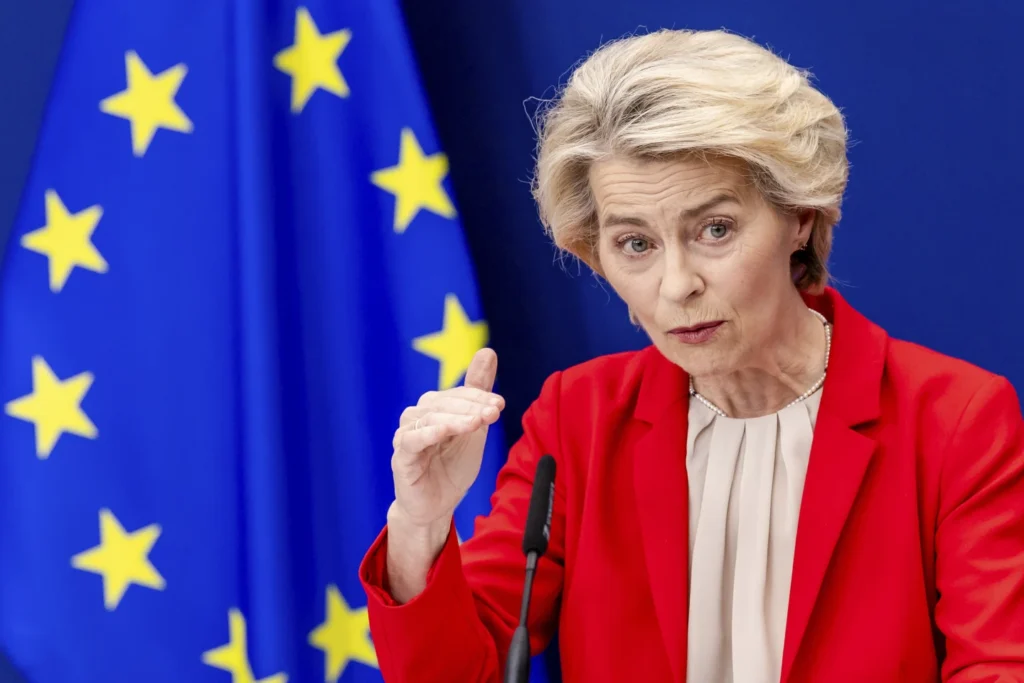The EU has announced its decision to suspend retaliatory tariffs on US goods scheduled to take effect tomorrow, Monday, July 14, 2025.
This is in hopes of reaching a trade deal with the Trump administration by the end of the month.
Speaking to reporters in Brussels, European Commission President, Ursula von der Leyen said, ″This is now the time for negotiations.″

Her remarks come after US President, Donald Trump sent a letter announcing new tariffs of 30% on goods from the EU and Mexico starting August 1, 2025.
The EU, negotiates trade deals on behalf of its 27 member countries, had been scheduled to impose ″countermeasures″ starting on Monday, July 14, 2025, at midnight Brussels time (6 p.m. EDT).
Von der Leyen said those countermeasures would be delayed until August 1, and that Trump’s letter shows ″that we have until the first of August″ to negotiate.
European leaders have urged Trump and von der Leyen to give negotiations more time. ″We have always been clear that we prefer a negotiated solution,″ she said.
If they can’t reach a deal, she said that ″we will continue to prepare countermeasures so we are fully prepared.″
A first package of countermeasures to U.S. tariffs on steel and aluminium that would hit 21 billion euros ($24.6 billion) in US goods was suspended in April for 90 days to allow time for negotiations. The suspension had been due to expire on Monday.
A second package has been in the works since May and would target 72 billion euros of US goods, but these measures have not yet been made public and the final list requires approval by member states.
Von der Leyen added that use of the EU’s Anti-Coercion Instrument was not yet on the table. “The (anti-coercion) instrument is created for extraordinary situations, we are not there yet,” she said.
The instrument allows the bloc to retaliate against third countries that put economic pressure on EU members to change their policies.
Possible retaliatory steps could include restricting EU market access to goods and services, and other economic measures related to areas including foreign direct investment, financial markets and export controls.
Trade Tensions Point To Need For Trade Relationship Diversity
Standing alongside Indonesian President Prabowo Subianto, von der Leyen stated that the trade tensions with the US show the importance of “diversifying our trade relationships.”
Trump has said that his global tariffs would set the foundation for reviving a US economy that he claims has been ripped off by other nations for decades.
Trump in his letter to the European Union— America’s biggest trading partner and the world’s largest trading bloc — said that the US trade deficit was a national security threat.
US trade partners have faced months of uncertainty and on-and-off threats from Trump to impose tariffs, with deadlines sometimes extended or changed. The tariffs could have ramifications for nearly every aspect of the global economy.
According to EU statistics agency Eurostat, the value of EU-US trade in goods and services amounted to 1.7 trillion euros ($2 trillion) in 2024, or an average of 4.6 billion euros a day.
Europe’s biggest exports to the US were pharmaceuticals, cars, aircraft, chemicals, medical instruments and wine and spirits.
Meanwhile, Trade Ministers from EU countries are scheduled to meet on Monday to discuss trade relations with the US, as well as with China.
READ ALSO: Government Launches Accountability Series to Deepen Transparency



















